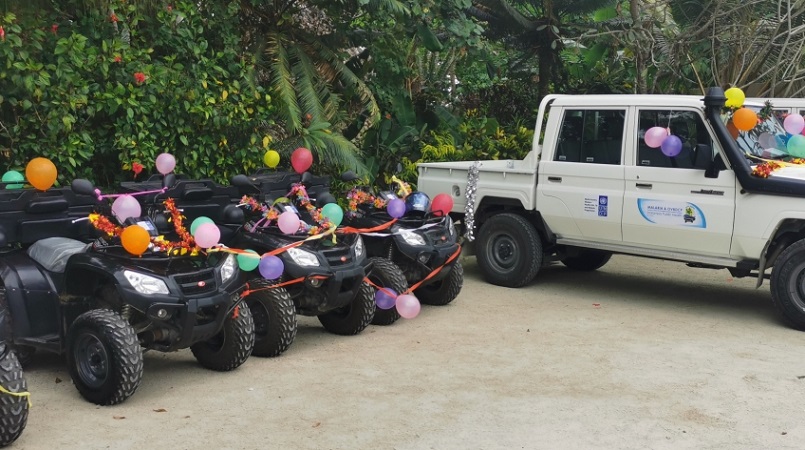
Two new Land Cruiser pick-up trucks and four quad-bikes were officially handed over to the Vanuatu Ministry of Health by the United Nations Development Programme (UNDP).
This is part of ongoing efforts to accelerate towards malaria elimination in Vanuatu and enhance coverage of life-saving health services across the country.
The Land Cruisers will be used on the islands of Santo in Sanma province, and Malekula in Malampa province – the two largest land masses in Vanuatu – for malaria case investigation, surveillance and timely reporting. While the quad-bikes will be used for malaria case investigation and supervisory visits in Tafea, Malampa and Sanma. Deployment of teams for rapid investigation and response is essential to ensure every last case is reached and treated to halt all transmission and achieve malaria elimination.
The vehicles were officially handed over during a ceremony at the Malaria Annual Review and Planning Meeting in Port Vila.
“These vehicles have been needed for a long time and we are very fortunate that this need is now being addressed with support from UNDP and the Global Fund,” said Timothy Takau, a procurement and supply chain management officer with the Malaria & Other Vector Borne Diseases Control Program. “On behalf of the Program, I would like to thank our partners for their continued support. The vehicles will be used to save people’s lives and will serve the people of Vanuatu.”
In Vanuatu, significant progress has been made on malaria over the last few decades, with annual parasite incidence (API) dropping from an estimated 198 per 1,000 people in 1990, to 74 per 1,000 in 2003 and to just 1.7 per 1,000 in 2020. The province of Tafea succeeded in achieving malaria-free status in 2017. However, there continue to be high levels of malaria transmission in the provinces of Sanma and Malampa, and therefore these locations are the focus of malaria control and elimination efforts.
Procurement of the vehicles was supported through the [Ensure 81% Coverage of Long Lasting Insecticide Treated Nets (LLINs) in Vanuatu Programme. The project is funded by the Global Fund and implemented by UNDP in collaboration with the Vanuatu Ministry of Health Malaria Control Program. The World Health Organization also provides technical assistance with support for other activities through partners such as the Australian Government, Rotarians Against Malaria and the Vanuatu Red Cross Society.
Due to the rugged terrain, providing malaria services to the local populations has been a challenge for many years, especially for remote areas with poor road infrastructure. The vehicles will help to address this situation by increasing the coverage and speed of service delivery.
“On behalf of the Vanuatu Government and people of Vanuatu through the Ministry of Health, I wish to convey our sincere gratitude to UNDP/Global Fund as international partners for the continued funding support and assistance to our Malaria Program, and especially during this period of COVID-19 as the country is mobilizing its limited resources to cope with the pandemic,” said Russel Tamata, Director General, Ministry of Health.
“The delivery of these vehicles is part of broader support by UNDP, with support from the Global Fund, to assist Vanuatu in reaching its goal of malaria-free status by the year 2026,” said Gayane Tovmasyan, Programme Manager, UNDP. “Achieving this goal will hopefully enable a healthier and more prosperous future for the people of Vanuatu.”
The UNDP-Global Fund project focuses primarily on ensuring high levels of access to and use of LLINs, including that all children under 5 years old and all pregnant women sleep under LLINs. In addition, the project aims to build the capacity of the Ministry of Health for a sustainable response and strengthen monitoring and evaluation systems.
Photo supplied
